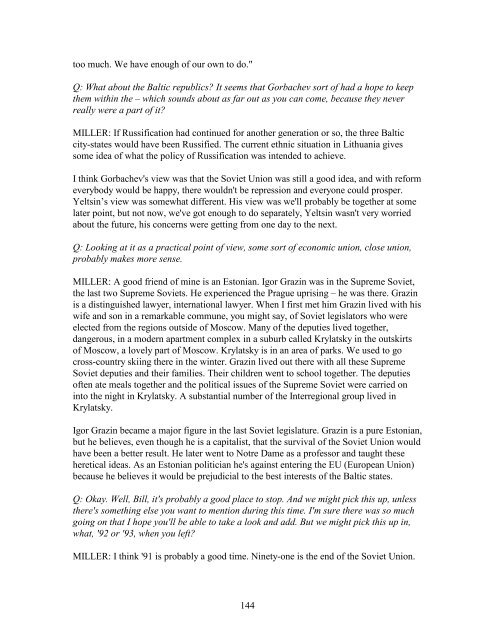1 The Association for Diplomatic Studies and Training Foreign ...
1 The Association for Diplomatic Studies and Training Foreign ...
1 The Association for Diplomatic Studies and Training Foreign ...
You also want an ePaper? Increase the reach of your titles
YUMPU automatically turns print PDFs into web optimized ePapers that Google loves.
too much. We have enough of our own to do."<br />
Q: What about the Baltic republics? It seems that Gorbachev sort of had a hope to keep<br />
them within the – which sounds about as far out as you can come, because they never<br />
really were a part of it?<br />
MILLER: If Russification had continued <strong>for</strong> another generation or so, the three Baltic<br />
city-states would have been Russified. <strong>The</strong> current ethnic situation in Lithuania gives<br />
some idea of what the policy of Russification was intended to achieve.<br />
I think Gorbachev's view was that the Soviet Union was still a good idea, <strong>and</strong> with re<strong>for</strong>m<br />
everybody would be happy, there wouldn't be repression <strong>and</strong> everyone could prosper.<br />
Yeltsin’s view was somewhat different. His view was we'll probably be together at some<br />
later point, but not now, we've got enough to do separately, Yeltsin wasn't very worried<br />
about the future, his concerns were getting from one day to the next.<br />
Q: Looking at it as a practical point of view, some sort of economic union, close union,<br />
probably makes more sense.<br />
MILLER: A good friend of mine is an Estonian. Igor Grazin was in the Supreme Soviet,<br />
the last two Supreme Soviets. He experienced the Prague uprising – he was there. Grazin<br />
is a distinguished lawyer, international lawyer. When I first met him Grazin lived with his<br />
wife <strong>and</strong> son in a remarkable commune, you might say, of Soviet legislators who were<br />
elected from the regions outside of Moscow. Many of the deputies lived together,<br />
dangerous, in a modern apartment complex in a suburb called Krylatsky in the outskirts<br />
of Moscow, a lovely part of Moscow. Krylatsky is in an area of parks. We used to go<br />
cross-country skiing there in the winter. Grazin lived out there with all these Supreme<br />
Soviet deputies <strong>and</strong> their families. <strong>The</strong>ir children went to school together. <strong>The</strong> deputies<br />
often ate meals together <strong>and</strong> the political issues of the Supreme Soviet were carried on<br />
into the night in Krylatsky. A substantial number of the Interregional group lived in<br />
Krylatsky.<br />
Igor Grazin became a major figure in the last Soviet legislature. Grazin is a pure Estonian,<br />
but he believes, even though he is a capitalist, that the survival of the Soviet Union would<br />
have been a better result. He later went to Notre Dame as a professor <strong>and</strong> taught these<br />
heretical ideas. As an Estonian politician he's against entering the EU (European Union)<br />
because he believes it would be prejudicial to the best interests of the Baltic states.<br />
Q: Okay. Well, Bill, it's probably a good place to stop. And we might pick this up, unless<br />
there's something else you want to mention during this time. I'm sure there was so much<br />
going on that I hope you'll be able to take a look <strong>and</strong> add. But we might pick this up in,<br />
what, '92 or '93, when you left?<br />
MILLER: I think '91 is probably a good time. Ninety-one is the end of the Soviet Union.<br />
144
















